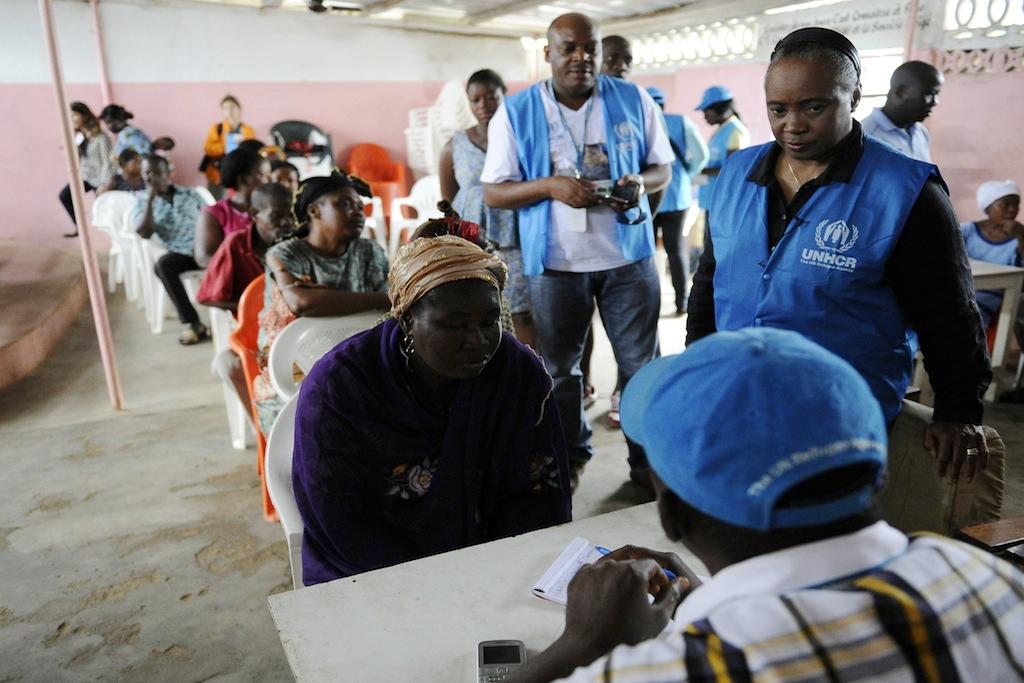A child without a country is a common dilemma facing countries as UNHCR seeks to help
US opera singer and goodwill ambassador for the United Nations High Commissioner for Refugees (UNHCR) Barbara Hendricks (R) looks on as stateless people are registered on June 26, 2014 in a neighborhood of Abidjan during her visit to Ivory Coast to highlight UNHCR’s campaign on statelessness.
ABIDJAN, Côte d'Ivoire — Until recently, Anastasie, 14, was living under a bridge in a small village in western Côte d'Ivoire. Her mother died when she was a baby. She has never met her father. She was abandoned by her foster family, and has no other ties. She has no documents to prove her identity. No one can vouch for her place of birth or testify that she was born to an Ivorian parent, the strict legal requirement to prove citizenship in Côte d'Ivoire.
Being “from nowhere,” bereft of citizenship, is not just an administrative inconvenience; it has severe consequences. When Anastasie turns 18, she will not be able to go to university or get a job. She will not be allowed to open a bank account, own land, get legally married, register the birth of her children, travel or vote.
Anastasie is not alone. The United Nations High Commissioner for Refugees (UNHCR) estimates that close to 10 million people around the world also are stateless and are not considered nationals of any country.
Even that number may be an underestimate. A major challenge facing UNHCR and the Ivoirian government — and all other countries harboring the statelessness — is that exact figures are hard to come by. It's a Catch-22 situation: stateless people are effectively invisible in the eyes of the law and therefore difficult to count; without precise numbers, it is impossible to assess the scale of the problem and design policies to address it.
Côte d'Ivoire, home to one of the biggest stateless populations in Africa, has taken important steps. The government acceded last year to the two international conventions designed to prevent and reduce statelessness, one of which obliges Côte d'Ivoire to grant citizenship to Anastasie. It is also currently helping people at risk of statelessness acquire Ivoirian nationality through a process of simple declaration.
UNHCR is supporting these efforts by identifying stateless people around the country and advocating for concrete measures to be taken to protect these individuals. In October, UNHCR will host a regional ministerial-level meeting in Abidjan, and it is hoped that this gathering will result in strong commitments by the members of the Economic Community of West African States to take urgent steps to eradicate statelessness in the coming 10 years.
Yet there remains a general lack of awareness of the problem, even among the populations at risk. People often do not realize or understand the legal limbo in which they are trapped until it is too late, and their status is passed on to their children. This vicious circle will be perpetuated for generations unless concrete steps are taken, such as nationality law reforms and increased awareness-raising.
Three months ago, Anastasie heard about a community center that provided support to orphans and other vulnerable children. She was quickly placed in the care of a social worker who has since adopted her and given her a home. Although she is still stateless, her situation has at least been brought to the attention of the authorities and steps are being taken to help her.
She is one of the lucky ones. Thousands of children in Côte d'Ivoire and the surrounding region lead lives in the shadows, afraid of being caught and detained for not having any documentation.
It is not too late to help them.
With political will and sustained action on the part of governments around the world, this overlooked human rights crisis can be resolved.
Citizenship and the right to protection it bestows is a fundamental human right. UNHCR is raising awareness and supporting a decade-long campaign to eradicate statelessness around the world so that Anastasie and others like her can look forward to the future and enjoy the protection and dignity that the rest of us take for granted.
Mohamed Toure is the representative of the United Nations High Commissioner for Refugees (UNHCR) in Cote d'Ivoire. By training, he is an international human rights lawyer.
We want to hear your feedback so we can keep improving our website, theworld.org. Please fill out this quick survey and let us know your thoughts (your answers will be anonymous). Thanks for your time!
